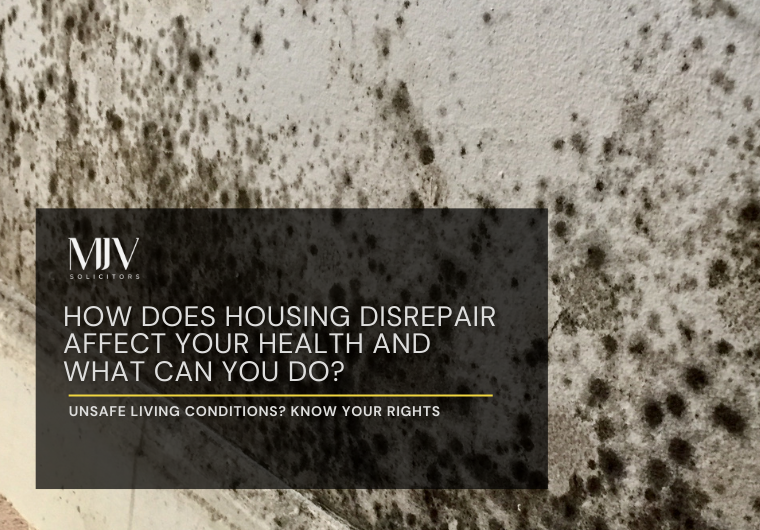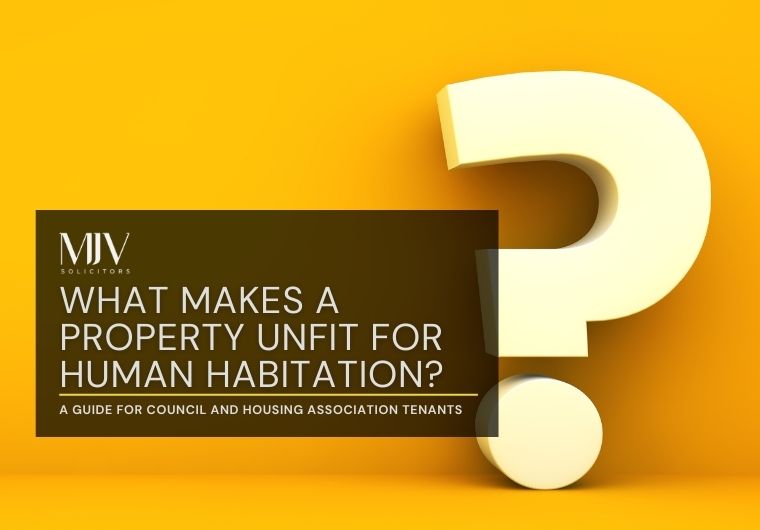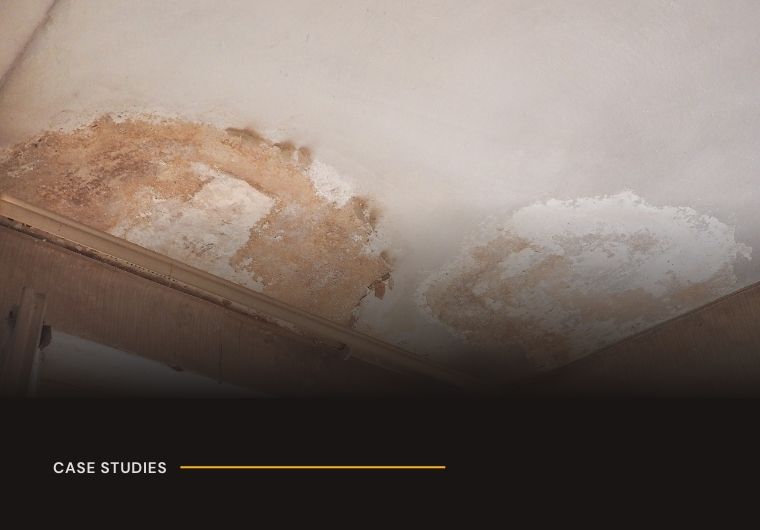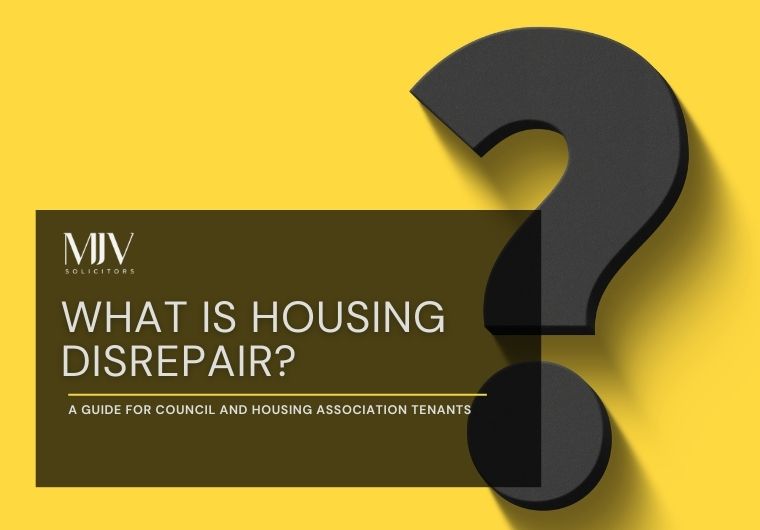Dealing with a housing disrepair issue can damage more than just your home; it can also seriously affect your mental health and physical wellbeing. Council or housing association tenants are particularly vulnerable when landlords fail to carry out essential repairs to the property. Tenants can be exposed to damp, mould, cold, or other hazardous living conditions that can take a real toll on a person’s physical and mental condition.
In this guide, our housing disrepair specialists explain the impact of property disrepair, how to recognise when your health is being affected, and what you can do to get help, repairs, and compensation you need.
How Poor Housing Conditions Lead to Poor Health
The World Health Organization (WHO), along with numerous public health bodies in the UK, identify housing as a key factor influencing health. Poor housing conditions, such as cold, damp, and unsafe homes, can contribute to a wide range of physical and mental health problems.
Housing disrepair and poor housing conditions can expose tenants to several health risks, including:
- Triggering or worsening existing health conditions, such as respiratory problems, including asthma and cardiovascular diseases
- Exposing tenants to new health risks, such as carbon monoxide leaks
- Structurally deficient housing increases the risk of injury and accessibility issues
- Poor housing conditions are directly linked to poor mental health, such as anxiety, depression and psychological distress
What Are the Common Health Issues Associated with Housing Disrepair?
Poor housing and disrepair are associated with a wide range of health conditions, with some of the most common being:
- Respiratory Conditions
Exposure to damp and mould in properties is known to:
- Worsen asthma, bronchitis and other respiratory diseases
- Trigger coughing, wheezing, and breathlessness
- Increase the risk of respiratory infections
Young children and the elderly are particularly vulnerable to poor living conditions. However, anyone exposed to damp or mould for extended periods of time can suffer from lung irritations and poor respiratory health.
- Allergies and Skin Conditions
Poor living conditions, such as untreated mould spores or pests (like dust mites or cockroaches), can trigger several health issues, including:
- Allergic reactions
- Eczema flare-ups
- Skin rashes or irritation
These symptoms often improve when tenants move to a properly maintained property or once repairs have been completed.
- Mental Health Problems
Several housing organisations and studies, including the WHO, directly link poor housing conditions to poor mental health, noting that this may lead to:
- Stress, frustration and a feeling of hopelessness
- Depression or anxiety
- Sleep deprivation
Tenants who live in unsafe environments report feeling trapped, ignored, and not in control of their living conditions when landlords fail to fix basic problems. These feelings of stress and anxiety can worsen when poor housing affects children or vulnerable family members.
- Illness Impacted by Cold
Homes with faulty heating or poor insulation can make homes dangerously cold, especially during the winter months. Cold living conditions can cause serious health problems, including:
- Hypothermia in elderly tenants or those with existing health conditions
- Worsening arthritis and joint pain
- Increased risk of strokes and heart attacks
A warm, well-maintained, and adequately insulated property is essential for good health and especially important for children, vulnerable individuals, and elderly adults.
- Increased Risk of Accidents and Injuries
Poorly maintained properties and structural hazards significantly increase the risk of accidents and injuries in the home. Examples of disrepair include:
- Loose floorboards
- Broken stairs or bannisters
- Faulty electrics
…can cause slips, trips, falls, burns, and electric shocks. These hazards and unsafe features pose significant risks to children and older tenants.
How Do You Recognise When Disrepair Is Affecting Your Health?
If you believe you are living in a poorly maintained property or being exposed to dangerous housing conditions, ask yourself the following questions:
- Have you or a family member developed new health problems since the property disrepair began?
- Are existing health conditions (e.g. asthma, arthritis, etc.) getting worse?
- Do the symptoms improve when you spend time away from the home?
- Has your GP suggested links between your health and housing conditions?
If you have answered yes to any of the above, it’s time to act.
What Can You Do If Disrepair Is Affecting Your Health?
Below, we set out the steps you should take if disrepair is affecting your health:
Step 1: See Your GP
Ask your doctor or health practitioner to:
- Record your symptoms
- Provide a letter linking your health problems to the condition of your living conditions
- Prescribe medical treatment if necessary. Make sure you record any costs of prescriptions.
Medical records and supporting documentation from your healthcare team can strengthen a disrepair claim or complaint.
Step 2: Report The Disrepair to Your Landlord in Writing
A vital step in disrepair cases is notifying your landlord of the complaint. Let your landlord know:
- What the disrepair issue is
- How long the disrepair has been affecting you or your family
- What the health implications are
Keep records of all correspondence with your landlord and be sure to follow up if they fail to respond or adequately address your complaint.
Step 3: Gather Evidence
It is essential to gather as much evidence as possible, which could include:
- Photos of the disrepair
- Medical letters or prescriptions
- Records or receipts of any out-of-pocket expenses (e.g. medication, extra heating costs, loss of earnings due to illness)
- A diary of symptoms
- Communication with the landlord or housing association
Step 4: Make a Complaint
If your landlord fails to respond to or fix issues to a satisfactory level, you can raise a formal complaint through their complaint procedures. If you are still unhappy with the outcome, you can escalate your matter to the Housing Ombudsman.
Step 5: Seek Legal Guidance from a Disrepair Solicitor
If you are unable to resolve a dispute on your own, a solicitor who has specialist expertise in disrepair claims can help:
- Negotiate with the landlord to get repairs carried out quickly
- Claim compensation for health or injury impacts
- Help with expert reports or medical evidence to support your claim
- Legal protection at no upfront cost
What Can You Claim For?
If disrepair has caused or worsened your health issues, you may be entitled to make a compensation claim for:
- Pain and suffering
- Medical expenses
- Loss of earnings and time off work
- Mental health impacts
- Inconvenience and distress
The amount of compensation awarded will depend on various factors, including the severity of the health condition, the length of time affected, and the evidence you can provide.
At MJV Solicitors, we handle everything on a No Win, No Fee basis. Visit our website for more information about how to start your claim for Housing Disrepair.
Case Study: Real-Life Example of How We Helped a Disrepair Client
Family in Birmingham Suffering from Damp and Mould in Home Awarded £11,500 Compensation
A family in Birmingham suffered from damp and mould in their 3-bedroom council house. The youngest child developed a chronic cough and was hospitalised on two occasions. The parents reported the issue six times, but no action was taken.
After seeking legal advice with our team:
- A medical report confirmed the link between the mould and the child’s illness
- The court ordered repairs to be carried out
- The family was awarded £11,500 in compensation
Are You Living in Unsafe Conditions That Are Affecting Your Health?
You should not have to accept poor housing conditions or unsafe living environments. Your landlord, council, or housing association has legal obligations to act if disrepair is damaging your health.
Act fast, get medical help, report it in writing, and seek legal advice. You may be entitled to both repairs and compensation.
Get in Touch Now for a Free Case Assessment
At MJV Solicitors, we help tenants take action when landlords fail to maintain safe and healthy properties. If you or a loved one’s health is being affected by disrepair, contact us today for specialist advice and support.
- Call us on 01253 858231
- Message us on WhatsApp or Facebook
- Visit our website for more information about how to start your claim for Housing Disrepair
This article is for general information only and does not constitute legal advice.







